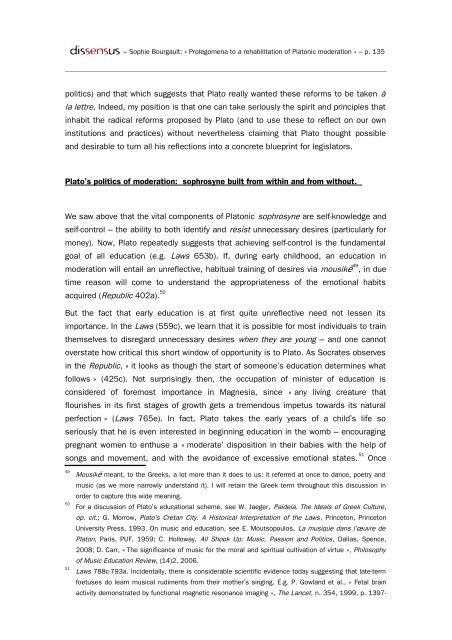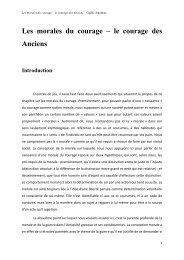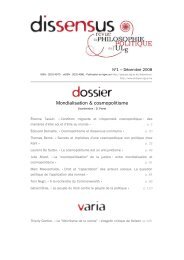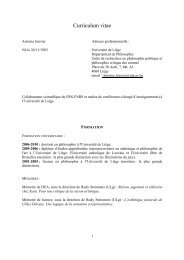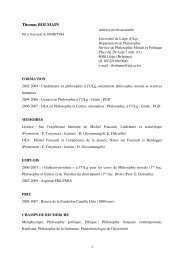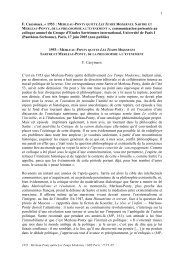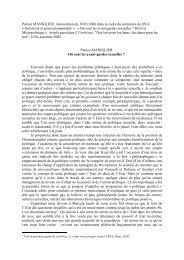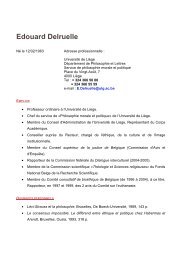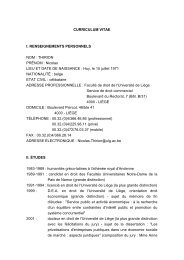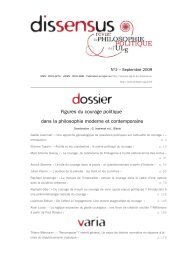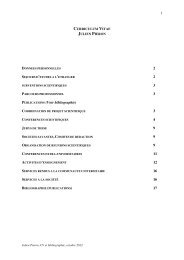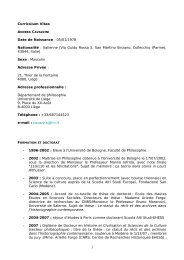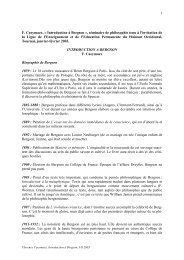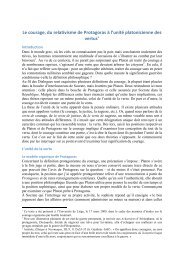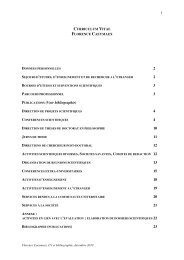Subjectivations politiques et économie des savoirs - Service de ...
Subjectivations politiques et économie des savoirs - Service de ...
Subjectivations politiques et économie des savoirs - Service de ...
Create successful ePaper yourself
Turn your PDF publications into a flip-book with our unique Google optimized e-Paper software.
– Sophie Bourgault: « Prolegomena to a rehabilitation of Platonic mo<strong>de</strong>ration » – p. 135<br />
politics) and that which suggests that Plato really wanted these reforms to be taken à<br />
la l<strong>et</strong>tre. In<strong>de</strong>ed, my position is that one can take seriously the spirit and principles that<br />
inhabit the radical reforms proposed by Plato (and to use these to reflect on our own<br />
institutions and practices) without nevertheless claiming that Plato thought possible<br />
and <strong><strong>de</strong>s</strong>irable to turn all his reflections into a concr<strong>et</strong>e blueprint for legislators.<br />
Plato’s politics of mo<strong>de</strong>ration: sophrosyne built from within and from without.<br />
We saw above that the vital components of Platonic sophrosyne are self-knowledge and<br />
self-control – the ability to both i<strong>de</strong>ntify and resist unnecessary <strong><strong>de</strong>s</strong>ires (particularly for<br />
money). Now, Plato repeatedly suggests that achieving self-control is the fundamental<br />
goal of all education (e.g. Laws 653b). If, during early childhood, an education in<br />
mo<strong>de</strong>ration will entail an unreflective, habitual training of <strong><strong>de</strong>s</strong>ires via mousikē 49 , in due<br />
time reason will come to un<strong>de</strong>rstand the appropriateness of the emotional habits<br />
acquired (Republic 402a). 50<br />
But the fact that early education is at first quite unreflective need not lessen its<br />
importance. In the Laws (559c), we learn that it is possible for most individuals to train<br />
themselves to disregard unnecessary <strong><strong>de</strong>s</strong>ires when they are young – and one cannot<br />
overstate how critical this short window of opportunity is to Plato. As Socrates observes<br />
in the Republic, « it looks as though the start of someone’s education d<strong>et</strong>ermines what<br />
follows » (425c). Not surprisingly then, the occupation of minister of education is<br />
consi<strong>de</strong>red of foremost importance in Magnesia, since « any living creature that<br />
flourishes in its first stages of growth g<strong>et</strong>s a tremendous imp<strong>et</strong>us towards its natural<br />
perfection » (Laws 765e). In fact, Plato takes the early years of a child’s life so<br />
seriously that he is even interested in beginning education in the womb – encouraging<br />
pregnant women to enthuse a « mo<strong>de</strong>rate’ disposition in their babies with the help of<br />
songs and movement, and with the avoidance of excessive emotional states. 51 Once<br />
49<br />
50<br />
51<br />
Mousik ē meant, to the Greeks, a lot more than it does to us: it referred at once to dance, po<strong>et</strong>ry and<br />
music (as we more narrowly un<strong>de</strong>rstand it). I will r<strong>et</strong>ain the Greek term throughout this discussion in<br />
or<strong>de</strong>r to capture this wi<strong>de</strong> meaning.<br />
For a discussion of Plato’s educational scheme, see W. Jaeger, Pai<strong>de</strong>ia. The I<strong>de</strong>als of Greek Culture,<br />
op. cit.; G. Morrow, Plato’s Cr<strong>et</strong>an City. A Historical Interpr<strong>et</strong>ation of the Laws, Princ<strong>et</strong>on, Princ<strong>et</strong>on<br />
University Press, 1993. On music and education, see E. Moutsopoulos, La musique dans l’œuvre <strong>de</strong><br />
Platon, Paris, PUF, 1959; C. Holloway, All Shook Up: Music, Passion and Politics, Dallas, Spence,<br />
2008; D. Carr, « The significance of music for the moral and spiritual cultivation of virtue », Philosophy<br />
of Music Education Review, (14)2, 2006.<br />
Laws 788c-793a. Inci<strong>de</strong>ntally, there is consi<strong>de</strong>rable scientific evi<strong>de</strong>nce today suggesting that late-term<br />
fo<strong>et</strong>uses do learn musical rudiments from their mother’s singing. E.g. P. Gowland <strong>et</strong> al., « F<strong>et</strong>al brain<br />
activity <strong>de</strong>monstrated by functional magn<strong>et</strong>ic resonance imaging », The Lanc<strong>et</strong>, n. 354, 1999, p. 1397-


